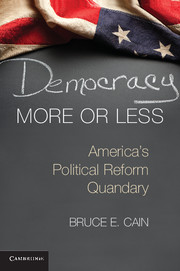Book contents
2 - Reform Pluralism
Published online by Cambridge University Press: 05 December 2014
Summary
The American political system is a palimpsest of incremental institutional changes layered on top of a blended constitutional design. In some instances, older features have been wiped away entirely (e.g., the indirect election of the US Senate) and replaced by new ones. But in others, the residual rules and processes simply coexist with the novel features (e.g., a president elected by an Electoral College but every other federal office chosen by popular vote). Given the different motives and principles behind all these changes, the real puzzle is not why the American political system is imperfect, but how it has managed to absorb so much heterogeneous tinkering and still function as well as it does.
In an idealized world, wise and experienced citizens would deliberate at length in the manner of the Founders over the current problems with US government and offer coherent proposals for reform. One of their goals would surely be to harmonize the government’s different processes in a logically consistent manner. But the modern American political environment is complex and sophisticated with many vested interests and inertial forces. Convening a US constitutional convention would be difficult if not impossible. To date, none of the twenty-seven amendments to the US Constitution has been approved this way. Instead, they were proposed by a congressional supermajority vote and then ratified by the states. Even assuming that the convention initiating obstacle could be overcome, the external pressures and expectations on modern US convention delegates would almost certainly be very different from those the Founders had to deal with. The delegates would be more diverse. Monitoring by the press, interest groups, and the public would be greater. And the partisan and ideological policy divisions would likely incite rampant rule gaming for political advantage in the convention.
- Type
- Chapter
- Information
- Democracy More or LessAmerica's Political Reform Quandary, pp. 20 - 40Publisher: Cambridge University PressPrint publication year: 2014



